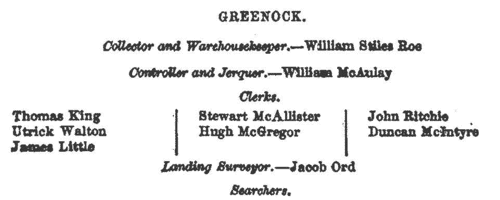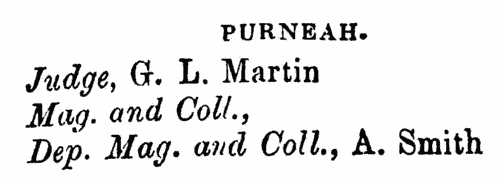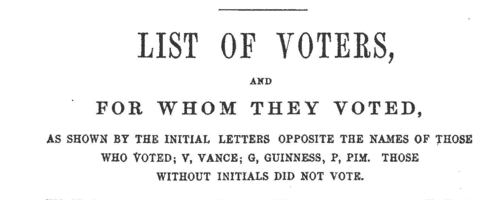Joynt Surname Ancestry ResultsOur indexes 1000-1999 include entries for the spelling 'joynt'. In the period you have requested, we have the following 54 records (displaying 1 to 10): Single Surname Subscription | | | Buying all 54 results of this search individually would cost £266.00. But you can have free access to all 54 records for a year, to view, to save and print, for £100. Save £166.00. More... |
These sample scans are from the original record. You will get scans of the full pages or articles where the surname you searched for has been found. Your web browser may prevent the sample windows from opening; in this case please change your browser settings to allow pop-up windows from this site. Taxpayers in Sussex
(1524-1525)
By Act of Parliament of 1523 (14 & 15 Hen. III, c. 16) a general subsidy was raised, spread over four years, from laymen, clergy and peers. In each of the first two years 1s in the £ was raised from annual income from land; 1s in the £ on capital goods worth over £2 and under £20; and a flat payment of 4d on goods worth from £1 to £2, and also by persons aged 16 and upwards in receipt of £1 per annum in wages. In the third year a further shilling in the pound was payable on land worth £50 and upwards a year; and in the fourth year a shilling in the pound on goods worth £50 and upwards. To raise this revenue, returns were required from every hundred, parish or township. In Sussex, the returns for 1524 and 1525 cover the city of Chichester (divided into Estrata, Westrata, Southstrata, North[strata] and Palenta), the borough of Midhurst, and then the rest of the county divided into rapes, within those into hundreds, and within those into boroughs, tithings, liberties, townships or parishes. It is important to note that the cinque ports of Hastings, Rye and Winchelsea were exempt from the subsidy, except for alien inhabitants; and that the town of Westbourne was also exempted 'as the town was lately destroyed by fire'. Aliens are noted as such, sometimes with nationality; and Brighthelmstone (Brighton), which had been burnt by the French in 1514, is only represented fragmentarily. The Sussex Record Society published this transcript and edition by Julian Cornwall of the 1524 and 1525 returns: the 1524 return was used for the main transcript where possible, names peculiar to the 1524 lists being marked with an asterisk, and those with amendments in 1524 with a dagger. At the foot of each 1524 return the new names from 1525 are given. Only the amount of the assessment is printed (m. = marks). Letters prefixed to the sum give the basis of the assessment, no letter (or G) meaning that it was on goods - A, annual wages; D, annual wages of day-labourers; F, fees or salaries of office; L, lands; P, profits; W, wages; x, no basis stated. JOYNT. Cost: £4.00.  | Sample scan, click to enlarge

| Irish Insolvents
(1827)
Insolvency notices for Ireland: insolvency often caused people to restart their lives elsewhere, so these are an important source for lost links, especially for emigrantsJOYNT. Cost: £6.00.  | Sample scan, click to enlarge

| Irish Insolvents
(1844)
Insolvency notices for Ireland: insolvency often caused people to restart their lives elsewhere, so these are an important source for lost links, especially for emigrantsJOYNT. Cost: £6.00.  | Sample scan, click to enlarge

| Customs Officers at Belfast
(1853)
The lists of customs officers at the outports of Great Britain and Ireland give the full names of the staff arranged by rank - usually the collector, controller, clerks, landing surveyors, searchers, superintendent of lockers, chief tide surveyor and inspector of water guard, tide surveyors, inspectors of patrol, and inspecting commander of coast guard. The jurisdiction of this port included the creek of Larne.JOYNT. Cost: £6.00.  | Sample scan, click to enlarge

|  Sailors and marines on H. M. S. London in the Crimean War
(1854-1856) Sailors and marines on H. M. S. London in the Crimean War
(1854-1856)
Sebastopol in the Crimea was the great Russian naval arsenal on the Black Sea. A combined assault by British, French and Turkish troops resulted in the reduction of Sebastopol and led to the Treaty of Paris of 27 April 1856, guaranteeing the independence of the Ottoman Empire. By Admiralty Order the Crimea Medal was awarded to sailors and marines present during the campaign, between 17 September 1854 (the first landing at Eupatoria) and 9 September 1855 (when the allies secured Sebastopol). The sailors' medals were mostly delivered to them on board ship in the course of 1856; the marines' medals were sent to their respective headquarters for distribution. The remarks as to distribution in this medal roll therefore give more specific information as to the whereabouts of the sailor recipients in 1856 than about the marines. Her Majesty's Ship London, a 90-gun sailing ship, took part in the assault. Four clasps to this medal were awarded to the men present in the actions at Sebastopol itself, Inkerman, Balaklave (Balaclava) and (the sea of) Azoff, but the recipients of these clasps are recorded on separate rolls, not part of this index, but indexed on this site.JOYNT. Cost: £8.00.  | Sample scan, click to enlarge

|  Sailors of H. M. S. Lynx who fought in the Azoff Sea
(1854-1856) Sailors of H. M. S. Lynx who fought in the Azoff Sea
(1854-1856)
Sebastopol in the Crimea was the great Russian naval arsenal on the Black Sea. A combined assault by British, French and Turkish troops resulted in the reduction of Sebastopol and led to the Treaty of Paris of 27 April 1856, guaranteeing the independence of the Ottoman Empire. By Admiralty Order the Crimea Medal was awarded to sailors and marines present during the campaign, between 17 September 1854 (the first landing at Eupatoria) and 9 September 1855 (when the allies secured Sebastopol). Her Majesty's Ship Lynx took part in the assault. Four clasps to this medal were awarded to the men present in the actions at Sebastopol itself, Inkerman, Balaklave (Balaclava) and (the sea of) Azoff. The Sea of Azoff (Azov, Azoph, Azof), east of the Crimean peninsula, is an arm of the Black Sea, with which it is united by the Straits of Kertch or Kaffa. This is the Azoff Clasp Roll, recording the names of the men from the ship who took part in the actions on the Azoff Sea during the Crimean War.JOYNT. Cost: £8.00.  | Sample scan, click to enlarge

| Gentry in London
(1856)
The Post Office London Directory for 1856 includes this 'Court Directory', listing alphabetically by surname and christian name the upper class residents of the capital with their postal addresses. 'In order to afford space for the addresses, the abbreviation "esq." for esquire has no longer been appended to each name in the Court Directory. It should be understood that such should be added to the name of every gentleman in the following pages to which no inconsistent addition is affixed.' Decorations, honours &c. are generally given. Some gentlemen appear who are also listed (as professional men, &c.) in the commercial section. Those with second residences in the provinces usually have the country address given as well.JOYNT. Cost: £4.00.  | Sample scan, click to enlarge

| Customs Officers in Belfast
(1858)
Complete lists of serving customs officers and clerks in the Port of London and all the outports of Britain and Ireland were published each year in The British Tariff. This issue is corrected to 30 September 1858: the sample scan shows the entry for Hartlepool.JOYNT. Cost: £6.00.  | Sample scan, click to enlarge

| British officers and civil servants in India
(1861)
The Indian Army and Civil Service List for July 1861 was printed by order of the Secretary of State for India in Council. Dating from after the reform of British rule in India in 1858, the one volume brings together lists of British military officers and civil officials. The regimental lists for the army in the three presidencies (Bengal, Madras and Bombay) are arranged as in any Army List of the period, giving officers by rank, with date of rank in the regiment and the army, and remarks. The native regiments had been reorganised and reduced from 174,237 of all ranks on 1 January 1859 to about 110,400 men in 1861. There are summary lists of all the native military, giving for each the names and dates of appointment of the British commandant, second-in-command, adjutant and medical charge - the Agra Levy, Alexander's Horse, Allahabad Levy, Allygurh Levy, Arracan Battalion, Assam Light Infantry, Bareilly Levy, Belooch Regiments, Benares Horse, Candeish Bheel Corps, Cawnpore Levy, Cutch Legion, Deolee Irregular Force, East Indian Regiment, Erinpoora Irregular Force, Extra Goorkha Regiment, Fane's Horse, Ferozepore Regiment, Futtehgurh Levy, Ghaut Police Corps, Guide Corps, Guzerat Bheel Corps, Guzerat Cooly Police Corps, Guzerat Irregular Horse, Guzerat Police Corps, Guzerat Provincial Battalion, Gwalior Camel Corps, Gwalior Infantry, Hazara Goorka Battalion, Hill Rangers, Hodson's Horse, Hyderabad Contingent, Jacob's Rifles, Kamroop Regiment, Kemaoon Battalion, Kemaoon Levy, Khelat-i-Ghilzie Regiment, Kolapore Infantry, Lahore Horse, Lucknow Regiment, Loodianah Regiment, Mahratta Horse, Malwa Bheel Corps, Meade's Horse, Meerut Levy, Meywar Bheel Corps, Mhair Regiment, Mhairwarrah Battalion, Mooltanee Cavalry, Moradabad Levy, Murray's Jhat Horse, Mynpoorie Levy, Nagpore Irregular Force, Nusseree Battalion, Patan Cavalry, Pegu Light Infantry Battalion, Ramgurh Irregular Cavalry, Poona Horse, Poorbeah Regiment, Punjab Cavalry, Punjab Infantry, Punjab Irregulars, Robarts's Horse, Rohilcund Horse, Rutnagherry Rangers, Sattara Local Corps, Sawunt Waree Local Corps, Scinde Horse, Sebundy Sappers and Miners, Seikh Infantry, Seikh Irregulars, Shahjehanpore Levy, Shekhawatee Battalion, Sirmoor Rifles, and Sylhet Light Infantry. European civil servants are listed from the Accountant-General's Office, Audit Department, Civil Service, Government Offices, Judge Advocate-General's Department, Public Works Departments and Surveyor-General's Department; and there are clergy, law and medical lists. JOYNT. Cost: £4.00.  | Sample scan, click to enlarge

| Dublin Electors
(1865)
This alphabetical list of electors for the City of Dublin for 1865 is annotated with details of the votes cast in the election of 15 July 1865 for a member of Parliament. The candidates were John Vance, Esq., D. L. (V), Benjamin Lee Guinness, Esq., D. L., LL. D. (G), and Jonathan Pim, Esq. (P). The first column gives, in bold, the initial of the ward in which lay the property that was the elector's qualification. The second column gives the elector's sequential number (alphabetically) within that ward. Then the elector's full name is given, surname first, and address, usually including house number. The votes cast are shown on the right: where these columns are blank, the elector did not vote. The key to the ward names is: A, South Dock; B, Donnybrook; C, Rathdown; D, Trinity; E, South City; F, Royal Exchange; G, Mansion House; H, Fitzwilliam; I, Wood Quay; K, Merchants' Quay; L, Usher's Quay; M, Arran Quay; N, Inns' Quay; O, North City; P, Rotundo; Q, Mountjoy; R; North Dock. S indicates the register of freemen.JOYNT. Cost: £4.00.  | Sample scan, click to enlarge

|
Research your ancestry, family history, genealogy and one-name study by direct access to original records and archives indexed by surname.
|













